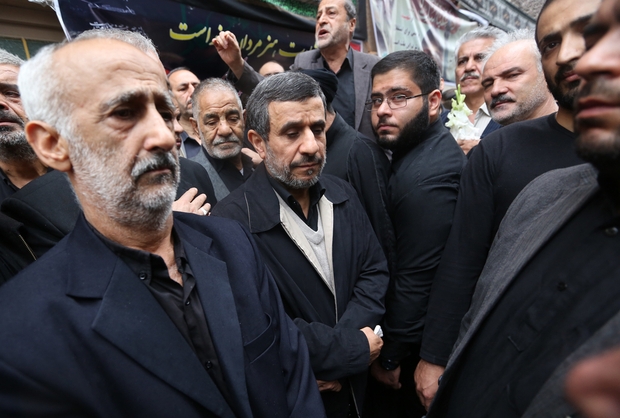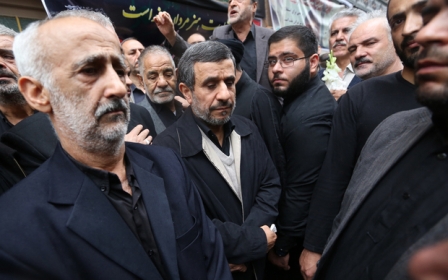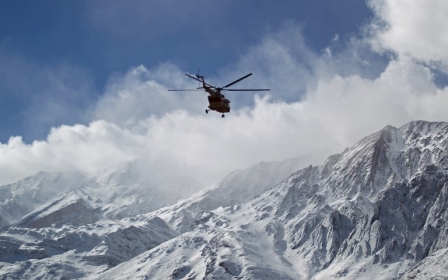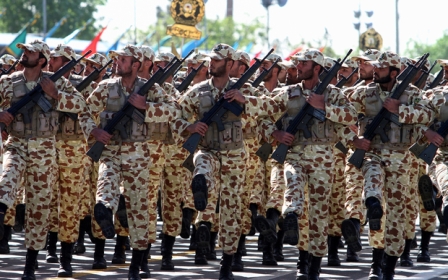Iran's elections should be 'free', Ahmadinejad writes to Khamenei

Former Iranian president Mahmoud Ahmadinejad, whose 2009 re-election prompted mass unrest over alleged vote-rigging, has called for "free" presidential and parliamentary elections, in an open letter to Supreme Leader Ayatollah Ali Khamenei.
Khamenei backed Ahmadinejad after his return to power sparked protests in which dozens of people were killed and hundreds arrested, rattling the ruling theocracy, before security forces led by the elite Revolutionary Guards stamped out the unrest.
But a rift developed between the two in 2011 when Khamenei, who has the last say over policy in the Islamic Republic, reversed Ahmadinejad's dismissal of the minister of intelligence and suggested he had overstepped his authority.
Ahmadinejad, a brash, populist hardliner while in office, could not run in the 2013 election as he had served the maximum two consecutive terms. Pragmatist Hassan Rouhani succeeded him in a landslide and again last year.
While Rouhani has called for a liberalisation of the economy and society and on the Revolutionary Guards not to interfere in elections, he has stopped short of explicitly advocating checks on the Supreme Leader's powers - something Ahmadinejad addressed in the letter to Khamenei published on his website on Wednesday.
"An immediate and essential need is the holding of quick and free elections for the presidency and the parliament, of course without the engineering of the Guardian Council and interference of military and security institutions, so the people have the right to choose," Ahmadinejad wrote.
Ahmadinejad's letter also called for "fundamental reforms” of the three branches of government - executive, parliament and judiciary - as well as the office of the Supreme Leader. He did not elaborate on what reforms he had in mind.
But it is nearly unheard of in Iran for officials to publicly criticise Khamenei or his powers; insulting the Supreme Leader is a crime.
Unrest broke out in December for the first time since 2009, mainly over economic hardships, but protesters soon targeted a perceived lack of democracy as well, demanding the removal of top officials, including Khamenei.
At least 25 people were killed and thousands detained before security forces cracked down in earnest and the protests fizzled out in January.
Ahmadinejad also called for the release of political prisoners and dismissal of hardline judiciary chief Ayatollah Sadeq Amoli Larijani, whom he has accused of unfairly targeting his allies.
Ahmadinejad's presidency revolved around his appeal to Iran's conservative, small-town working class and rural poor, and critics said his recent attacks on the country's clerical and security establishment after years of relative silence could be an attempt to lay the groundwork for a political comeback.
Rouhani's popularity has waned over his failure to notably improve the economy and ease repression in everyday life in spite of his 2015 deal with world powers that secured an end to sanctions on Iran in return for curbs on its nuclear programme.
Meanwhile, three police officers were killed in Tehran on Monday, a police spokesman said, as clashes broke out with members of a Muslim religious order seen as a threat to the Iranian theocratic establishment.
"Some disruptors of security and order used a bus today and killed three police officers. The murderers were arrested seconds after their crime," police spokesman Saeed Montazer al-Mahdi said on state television.
Middle East Eye propose une couverture et une analyse indépendantes et incomparables du Moyen-Orient, de l’Afrique du Nord et d’autres régions du monde. Pour en savoir plus sur la reprise de ce contenu et les frais qui s’appliquent, veuillez remplir ce formulaire [en anglais]. Pour en savoir plus sur MEE, cliquez ici [en anglais].




